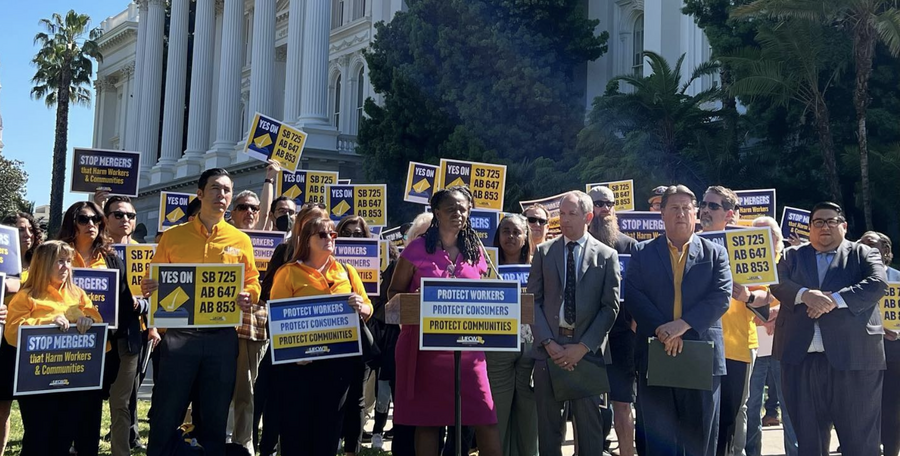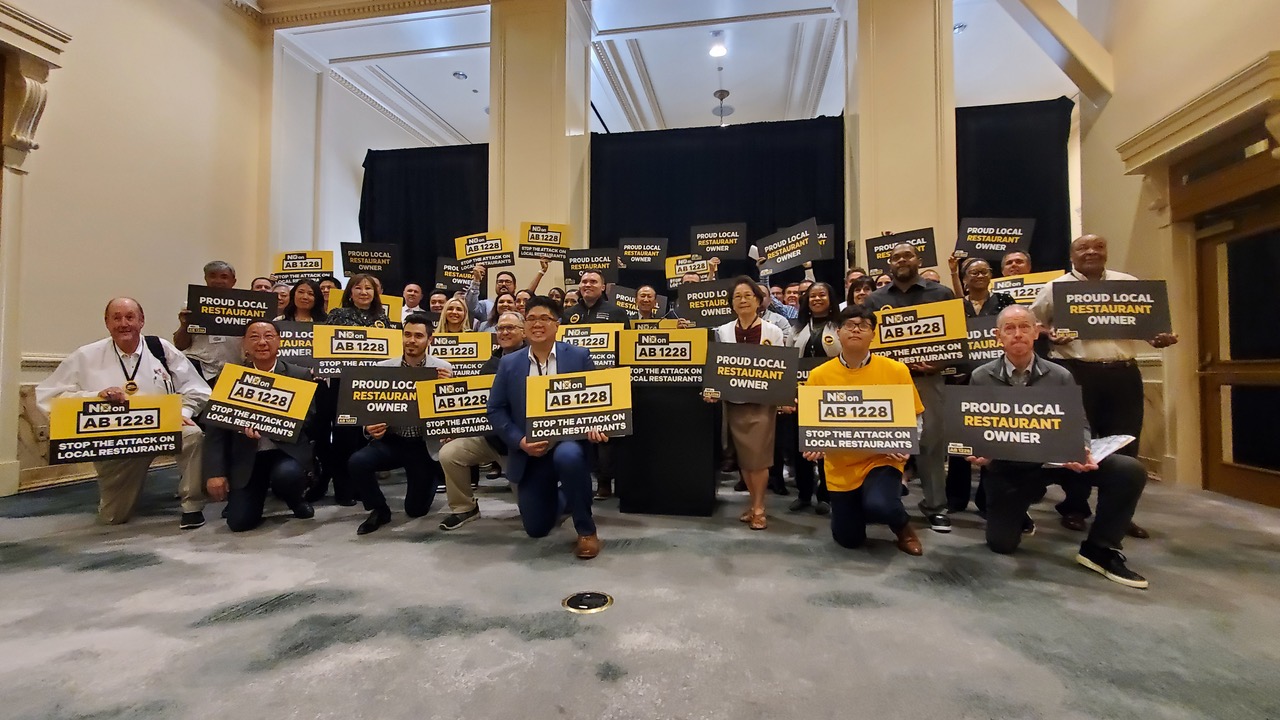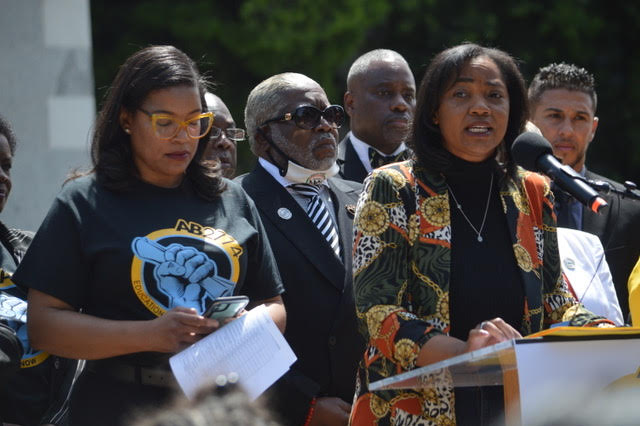
California Black Media Political Playback: News You Might Have Missed
Tanu Henry and Edward Henderson | California Black Media
Your roundup of stories you might have missed last week.
Sen. Lola Smallwood-Cuevas Is Leading Fight for Albertson’s Employees, Other Grocery Workers
Sen. Lola Smallwood-Cuevas (D-Ladera Heights), a member of the California Legislative Black Caucus, says she wants to protect workers who lose their jobs when there are mergers between grocery store chains.
In February, Smallwood-Cuevas introduced Senate Bill 725.
The bill would mandate that grocery store chains provide severance pay to workers laid off due to a merger or acquisition. The severance would be equal to “one week of pay for each full year of employment” if the employee is not retained for at least 90 days after a “change in control.”
Last week, workers unions, held a rally in support of SB 725 in Sacramento.
“I stood with grocery store workers who traveled to the State Capitol today to rally in support of a bill package that addresses the harmful effects of grocery mergers,” wrote the only Black woman Senator in the California Legislature on her Facebook page.
“This rally comes on the heels of a proposed deal between Albertson’s and Kroger – the nation’s two largest grocery store chains with an outsized presence in California – to ink a $24.6 billion merger.”
In April, the Senate Committee on Labor, Public Employment and Retirement voted 5-0 to advance the bill. It is now pending a third reading on the Senate Floor.
California Women in College Can Apply for Scholarships Up to $10,000 on Or Before May 31
The deadlineto apply for a Women in California Leadership (WICL) scholarship for deserving women who are college students is May 31.
The WICL Minerva Scholarship program is offering up to 108 scholarships valued at $3,000 each to California residents who identify as women and are enrolled full-time in an accredited program with a GPA of 2.5 or above.
One fortunate student will be granted a $10,000 scholarship.
“Women have made considerable advances in the workforce in recent years, yet still face inequities preventing them from taking part in decision-making processes,” said Assemblymember Tasha Boerner (D-Encinitas), a legislative champion of the program. “This scholarship opportunity helps break down a financial barrier to education in order for them to reach their full potential.”
WICL, a non-profit dedicated to raising awareness about issues critical to women in California, says the scholarship program “was established with the purpose of empowering women and enhancing the lives of women and girls.”
Fast Food Restaurant Owners Make Their Case in Sacramento
Last week, a group of fast-food restaurant owners, their supporters and advocates gathered at the State Capitol in Sacramento to oppose Assembly Bill (AB) 1228.

They believe the bill, which would require major fast-food businesses and franchisees to share legal responsibility for the franchisee’s workplace health and safety violations of California Labor Law, would harm their businesses.
The coalition’s rally at the State Capitol coincided with the launch of an ad campaign created to raise public awareness about the bill.
One ad the group released features Mat A., a Lake Elsinore restaurant owner.
“AB 1228 would force national fast-food corporations to take more control over local franchise restaurants, taking away the rights of local restaurant owners to run our own businesses. AB 1228 would destroy franchise businesses like mine,” he said.
California Coalition of Big City Mayors Hold Press Conference in Sacramento
Mayors from California’s 13 largest cities held a press conference in Sacramento last week. They urged Gov. Newsom and lawmakers to continue providing $2 billion per year in direct funding to for transitional and permanent housing and homelessness prevention programs. The mayors also requested the release of $316 million dollars in “bonus homelessness funding that is “available right now.”
At the event, the mayors released a report on the work they are doing to remove unhoused people from homelessness encampments to safe housing in their cities.
“These programs are working,” said San Diego Mayor Todd Gloria, chair of the California Big Cities Coalition. “Our 13 cities have funded nearly 16,000 new shelter and interim housing beds. We’ve served more than 121,000 Californians and provided placements to nearly 20,000 people. Through Project Homekey with created more than 5100 new homes across the state.
Los Angeles Mayor Karen Bass said since she took office her efforts have taken some 4000 Angelenos off the street but she can’t “do this work alone.”
“No mayor can do this work alone,” said Bass. “While this year’s state budget must be difficult, the need for housing interventions and services must remain a top priority.
Independent Legislative Analyst Office Respond’s to Gov. Newsom’s May Revise Budget
On May12, Governor Gavin Newsom presented his revised budget to the Legislature for review.

Last week, the Legislative Analyst’s Office (LAO) published a report providing commentary on the Governor’s proposed revisions and their effectiveness in solving California’s “budget problem.”
The budget problem the LAO is referring to is the state’s pending $31.5 billion-dollar deficit.
There were three key takeaways from the LAO’s report:
LAO estimates that with the Governor’s latest budget revision, the $28.3 billion budget problem was solved.
“Total budget solutions proposed in the May Revision (including those that persisted from the Governor’s budget) are: $15.1 billion in spending reductions and delays, $9.1 billion in cost shifts, $3.7 billion in revenue increases and shifts, and $450 million in reserve withdrawals,” the report highlighted.
Although revenues are always uncertain, the revision is predicated on optimistic estimates
“Based on our assessment, there is a roughly two‑thirds chance revenues will come in below May Revision estimates. As such, while we consider the May Revision revenues plausible, adopting them would present considerable downside risk.”
Adopting these estimates sets up a difficult January 2024
“Under our revenues, and after accounting for constitutional spending requirements, the budget problem for 2023‑24 is $6.2 billion larger than the administration’s estimates. The state currently has $11 billion in one‑time or temporary spending planned for 2023‑24 — amounts that could be reduced to address this larger budget problem.”
The concern is that once the new fiscal year begins in July and state departments begin distributing funds, pullbacks would need to be based on what money has gone out the door instead of the state’s priorities.





